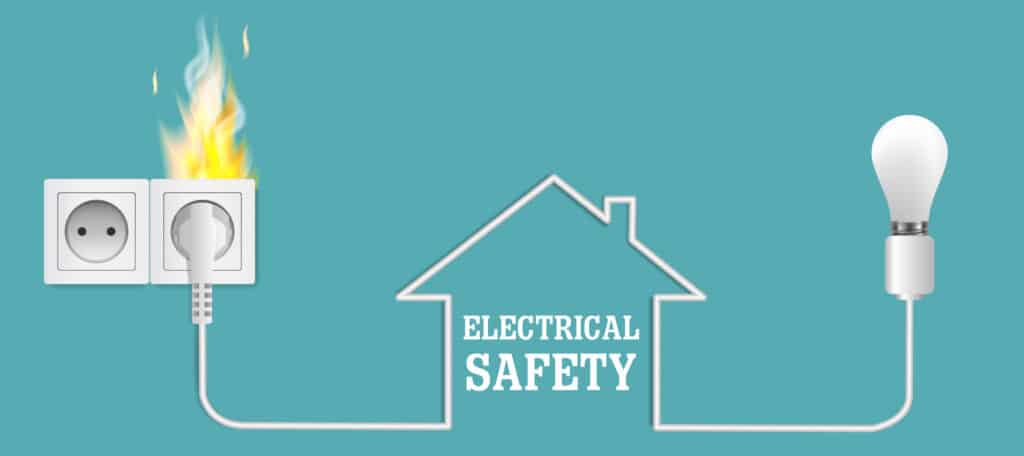Ensuring your home’s electrical systems are in tip-top shape is crucial for the safety of your loved ones and property. Home electrical safety should never be overlooked, as it forms the backbone of a secure and hazard-free living environment. With the rise in electronic device usage, the demand on home electrical systems has never been higher. This makes regular checks and maintenance not just advisable, but essential.
Residents of Greenville, SC, and its surrounding areas like Greer, SC, and Fountain Inn, SC, understand the importance of this safety aspect. The local climate and unique architectural styles can pose specific challenges to maintaining electrical safety at home. That’s why it’s important to have a comprehensive checklist that addresses all potential electrical safety concerns. Such a checklist ensures that nothing is left to chance, safeguarding your home against electrical mishaps.
Mister Sparky stands at the forefront of promoting home electrical safety. Our expertise and commitment to ensuring your home’s electrical systems are safe and up to code are unmatched. Whether it’s a routine inspection or a full-scale electrical upgrade, our team is equipped to handle your needs. We believe in a proactive approach to electrical safety, emphasizing the importance of regular checks and maintenance.
This article aims to provide you with the ultimate checklist for home electrical safety. By adhering to these guidelines, you can ensure that your home in Greenville, SC, Greer, SC, or Fountain Inn, SC, remains a safe haven. From understanding the basics of home electrical systems to recognizing signs of potential hazards, this checklist covers all you need to know. Stay safe and empowered with the right knowledge to protect your home and family.
Understanding the Basics of Home Electrical Safety
Understanding the basics of home electrical safety is the first step toward protecting your home and loved ones. It begins with recognizing how electricity flows into and throughout your home. This knowledge helps in identifying potential hazards before they escalate into serious issues. Every homeowner in Greenville, SC, should be familiar with their electrical panel, often considered the heart of a home’s electrical system.
Regular inspection of electrical cords and outlets is crucial. Check for fraying wires, loose connections, or signs of overheating, as these can be early indicators of electrical problems. Ensuring that outlets are not overloaded with multiple devices is a simple yet effective way to prevent overheating and fires. Residents in Greer, SC, can benefit from adopting these practices to enhance their home electrical safety.
Another key aspect involves understanding the capacity of your home’s electrical system. It’s essential to ensure that your system can handle the demands of modern appliances without overloading. If you notice frequent breaker trips or flickering lights, it might be time to consult a professional. This step is vital for homes in Fountain Inn, SC, where older electrical systems might need upgrades to support current electrical loads.
Lastly, the importance of installing and regularly testing smoke detectors cannot be overstated. These devices provide an early warning in the event of an electrical fire, giving you precious time to evacuate and call for help. Combining smoke detectors with a well-maintained electrical system creates a robust defense against electrical hazards, keeping your home safe and secure.
Regular Inspection Schedules for Electrical Systems
Adopting a regular inspection schedule is a crucial step in maintaining home electrical safety. It ensures that any potential hazards are identified and addressed promptly. For residents in Greenville, SC, setting up a bi-annual or annual inspection with a qualified electrician can make all the difference. These professionals can spot issues that might not be obvious to the untrained eye, offering peace of mind.
In Greer, SC, it’s wise to complement professional inspections with monthly homeowner checks. Look for new signs of wear on cords, test outlet functionality, and ensure that safety covers are in place to protect young children. This habit not only reinforces safety but also familiarizes homeowners with their electrical system’s nuances. By staying vigilant, you can catch and rectify minor issues before they escalate.
When it comes to older homes in Fountain Inn, SC, these regular checks are even more critical. Aging electrical systems may not be equipped to handle the load of modern appliances, making them more susceptible to issues. If an inspection reveals that your home’s electrical capacity isn’t up to par, it might be time to consider an upgrade. This proactive approach safeguards against potential hazards, ensuring your home remains a safe environment.
Finally, remember that home electrical safety is an ongoing commitment. Keep a record of all inspections and maintenance activities. This documentation can be invaluable for understanding your home’s electrical history and planning future upgrades or repairs. By adhering to a structured inspection schedule, you’re taking a significant step towards ensuring the safety and well-being of your home and family.
Identifying Common Electrical Hazards in Your Home
Identifying common electrical hazards in your home is a key step toward enhancing home electrical safety. Many homes, particularly in areas like Greenville, SC, may harbor unseen risks that could lead to serious consequences if not addressed. Overloaded power strips are a prime example, often used to accommodate multiple devices, they can easily become a fire hazard. Recognizing and rectifying such issues early can significantly reduce the risk of electrical mishaps.
In Greer, SC, outdated wiring poses another significant hazard. Homes with wiring that hasn’t been updated in decades may struggle to support the electrical demands of modern appliances. Signs of outdated wiring include frequent breaker trips and dimming lights when using appliances. Consulting a professional electrician to assess and possibly upgrade your wiring can prevent potential dangers.
Water exposure to electrical systems is a hazard that requires immediate attention. In areas like Fountain Inn, SC, where homes might experience varied weather conditions, ensuring that outdoor outlets have weatherproof covers and that indoor outlets near water sources are equipped with ground fault circuit interrupters (GFCIs) is crucial. These simple measures can prevent electric shock and are an important part of maintaining home electrical safety.
Finally, understanding the importance of proper light bulb wattage can prevent overheating and fire risks. Using bulbs that exceed the recommended wattage for lamps and fixtures is a common oversight that can easily be corrected. By choosing the correct wattage, you not only ensure the longevity of your lighting fixtures but also enhance the overall safety of your home.
Essential Tools for Home Electrical Safety
Having the right tools on hand is a crucial aspect of maintaining home electrical safety. A voltage tester, for example, is indispensable for any homeowner. This simple device allows you to check if wires or electrical devices are live, ensuring you avoid shocks during any DIY electrical work. It’s a small investment that can make a big difference in safety.
In Greer, SC, owning a circuit breaker finder can also significantly enhance your home’s electrical safety. This tool helps you locate the correct circuit breaker in your electrical panel for specific outlets or fixtures. It streamlines the process of turning off the power to the right area, making any electrical work safer and more efficient.
Residents of Fountain Inn, SC, should consider having a good quality multimeter in their home electrical safety toolkit. A multimeter measures various electrical properties like voltage, current, and resistance. It’s essential for diagnosing electrical problems, from simple battery tests to identifying issues in your home’s wiring system.
Lastly, a set of insulated screwdrivers is a must-have for any electrical safety toolkit. These screwdrivers are designed with insulated handles to protect you from electric shock when working on live components. Whether tightening a loose switch or installing a new outlet, insulated screwdrivers help ensure the job is done safely.
Implementing Childproofing Measures for Electrical Safety
Ensuring the safety of children in a home where electricity is a constant presence requires proactive measures. In Greer, SC, parents and guardians are adopting childproofing strategies to protect their little ones from electrical hazards. Simple steps like installing outlet covers can prevent curious fingers from exploring dangerous places. These covers are easy to install and offer a layer of protection that keeps children safe from electrical shocks.
Another effective childproofing measure involves securing cords and keeping them out of reach. Loose cords not only pose a tripping hazard but can also tempt children to pull on them, risking damage to appliances or, worse, electrical injuries. By using cord organizers or clips to keep cords neatly against walls, parents can significantly reduce these risks. This approach not only enhances home electrical safety but also keeps living spaces tidy and organized.
In Fountain Inn, SC, families are also focusing on the importance of educating children about electrical safety from an early age. Simple lessons on the dangers associated with playing near outlets or inserting objects into them can be lifesaving. Engaging children in conversations about electricity and its proper use encourages them to be mindful and cautious around electrical devices and outlets.
Lastly, the installation of tamper-resistant receptacles has gained popularity as a reliable childproofing solution. These receptacles have a built-in shutter system that prevents foreign objects from being inserted when unequal pressure is applied, as would be the case with a child attempting to insert an object. This innovation adds an extra layer of security, ensuring that homes are not only compliant with modern safety standards but also safer for the youngest residents.
The Importance of Surge Protectors in Home Electrical Safety
When considering home electrical safety, the role of surge protectors often goes unnoticed, yet they are critical in safeguarding your home’s electrical devices. These devices protect against voltage spikes that can damage electronics and appliances, ensuring their longevity and proper function. In Greer, SC, where storms can lead to unexpected power surges, having surge protectors in place is a wise precaution. They act as a barrier, preventing excess electricity from reaching and harming your valuable electronics.
In addition to protecting appliances, surge protectors also contribute to the overall safety of your home’s electrical system. By managing sudden increases in voltage, they help prevent fire hazards that can arise from overloaded circuits. This is particularly important in Fountain Inn, SC, where older homes might not have the electrical infrastructure to handle modern electrical demands. Integrating surge protectors into your home electrical safety plan is a simple step with significant benefits.
Educating yourself on the different types of surge protectors is also beneficial. Not all surge protectors are created equal, and understanding the specifications that match your home’s needs can optimize your protection. Look for protectors that offer enough outlets for your devices and have an appropriate joule rating for the equipment you’re safeguarding. This ensures that you’re not just adding a power strip but are genuinely enhancing your home’s electrical safety.
Lastly, regular checks on your surge protectors are essential, as their effectiveness can diminish over time. Just like any other aspect of home electrical safety, surge protectors require attention to ensure they’re functioning correctly. Checking for signs of damage or wear and replacing outdated units can keep your home safe from unexpected power surges. By maintaining your surge protectors, you’re taking a proactive step in protecting your home and family from potential electrical hazards.
How to Properly Use and Maintain Extension Cords
Properly using and maintaining extension cords is a crucial aspect of home electrical safety. In Greer, SC, residents understand the importance of not overloading extension cords, as this can lead to overheating and potential fire hazards. It’s essential to ensure that the extension cord is rated for the power needs of the devices plugged into it. This practice prevents damage to the cord and the devices, enhancing overall safety.
Inspecting extension cords regularly for signs of wear or damage is a simple yet effective way to maintain home electrical safety. Any cords with exposed wiring, frays, or cracks should be replaced immediately to avoid electrical shocks or fires. In Fountain Inn, SC, where families often rely on extension cords for outdoor activities, this tip is especially pertinent. Regular checks ensure that extension cords remain safe for use, contributing to a secure environment.
Storing extension cords properly when not in use also plays a significant role in maintaining their condition and safety. Coiling cords loosely and storing them in a dry, cool place helps prevent damage to the insulation and wires. This precaution keeps the cords in good working order, ready for safe use whenever they’re needed. Proper storage extends the life of extension cords, making it a cost-effective practice for homeowners.
Lastly, educating all household members on the correct use of extension cords is vital for home electrical safety. Ensuring that everyone knows not to run cords under carpets or through doorways minimizes risks. This education helps prevent accidents, keeping everyone in the home safe from electrical hazards. By following these guidelines, residents can enjoy the convenience of extension cords without compromising on safety.
Upgrading Your Home for Enhanced Electrical Safety
Considering the advancements in technology and the increasing reliance on electronic devices, upgrading your home’s electrical system is a proactive step towards enhancing home electrical safety. In Greer, SC, homeowners are recognizing the importance of modernizing their electrical panels and circuits to accommodate the growing electrical load. Upgrades not only support the safe operation of numerous devices but also significantly reduce the risk of electrical fires. This move ensures that homes meet current safety codes, providing peace of mind to residents.
In Fountain Inn, SC, the installation of arc-fault circuit interrupters (AFCIs) is becoming a common practice for preventing electrical fires. These advanced devices detect dangerous arc patterns in wiring and automatically shut off the power, thereby offering an additional layer of protection. Integrating AFCIs into your home’s electrical system addresses potential hazards before they escalate into serious issues. It’s a forward-thinking approach to safeguarding your home and family against electrical mishaps.
Another aspect of upgrading for enhanced electrical safety involves replacing outdated outlets with ground fault circuit interrupters (GFCIs). These are particularly crucial in areas prone to moisture, such as kitchens and bathrooms, where the risk of electric shock is higher. GFCIs monitor the flow of electricity and can interrupt power if a ground fault is detected, significantly reducing the likelihood of electric shock. By installing GFCIs, homeowners significantly boost their defense against one of the most common electrical hazards.
Lastly, considering the aesthetic and functional benefits of upgrading lighting fixtures and systems can also contribute to home electrical safety. LED lighting, for example, not only consumes less power but also generates less heat, reducing the risk of overheating and fires. For residents looking to enhance both the safety and ambiance of their homes, exploring energy-efficient lighting solutions is a wise decision. Such upgrades not only improve the safety of your electrical system but also elevate your living environment, making it a win-win scenario.
Frequently Asked Questions
What is a home electrical safety inspection?
A home electrical safety inspection checks your home’s electrical system to ensure it’s safe and meets current standards. During the inspection, a professional examines wires, systems, and components for damage or wear. They also look for any potential hazards that could lead to electrical fires or shocks. This process helps keep your home safe and your electrical system running smoothly.
How often should wiring be checked?
Wiring in your home should undergo a checkup at least every few years. Experts recommend more frequent inspections for older homes, typically every 1-2 years. This ensures your home’s electrical safety remains a top priority. Regular checks help identify issues early, keeping your electrical system in good shape.
What are common electrical hazards at home?
Common electrical hazards in homes include overloaded power outlets, which can lead to fires. Frayed wires or cords pose a risk of shock and should be replaced promptly. Water near electrical appliances increases the chance of electrocution, so keep them dry. Lastly, outdated wiring struggles to handle modern electrical loads, risking overheating and fire.
How can I improve my home electrical safety?
Improving your home electrical safety is straightforward with a few key steps. Start by scheduling regular inspections with a qualified electrician to catch any potential issues early. Ensure all appliances and cords are in good condition, replacing any that are worn or damaged. Additionally, avoid overloading outlets and use surge protectors to safeguard your electronics. By following these guidelines, you can enhance the safety of your home’s electrical system.
What items are on a home electrical safety checklist?
A home electrical safety checklist includes several key items to ensure your home is safe. It starts with checking all outlets and switches for proper operation and no signs of damage. Then, inspect cords and appliances for wear or fraying, replacing any that are damaged. Smoke detectors and circuit breakers should also be tested regularly to confirm they’re functioning correctly. Following this checklist can significantly reduce the risk of electrical hazards in your home.








